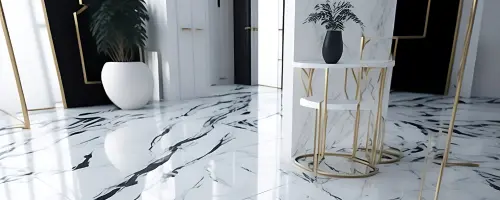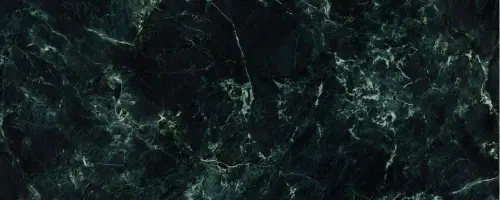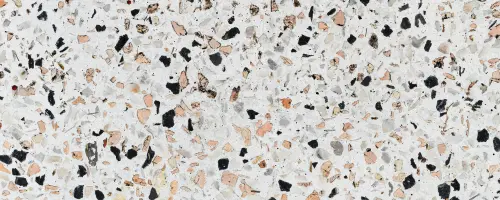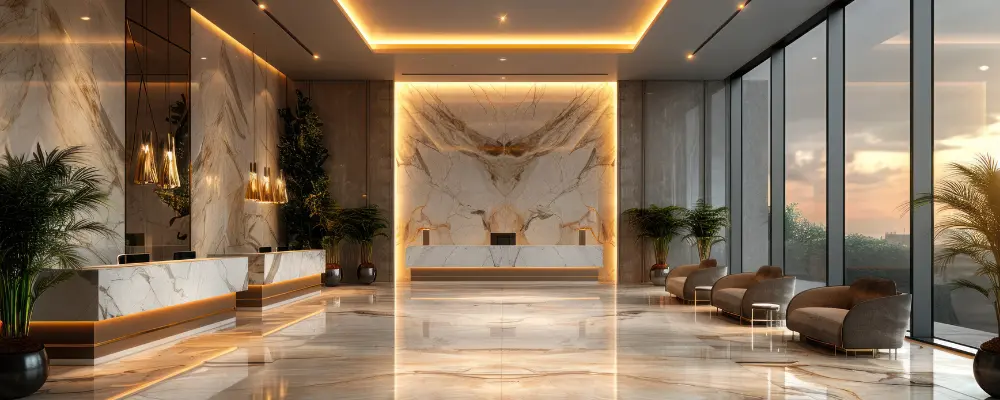Selecting the right type of flooring material can be a daunting task, considering that it is one of the most essential elements that can “make or break” the look of your home. A luxurious or high-end floor can instantly elevate any space and define the tone of the house, ranging from warm and inviting to cold and unwelcoming. So, what are the flooring materials available to add timeless elegance to your home and what are the factors you need to look out for? Read on to learn more.
Types of Flooring for Luxury Interiors:
Flooring materials can be broadly categorised into two types- natural and manufactured. While natural materials are often preferred by those who wish to incorporate sustainability in their homes, manufactured materials may provide a wider range of options to choose from and increased customisation.
Natural Flooring Materials
- Onyx
- Marble
- Granite
Manufactured Flooring Materials
- Vitrified Tiles
- Terrazzo
Natural Flooring Materials
A wide range of natural materials with high-end finishes are available in the market today. These are an ideal choice if sustainability is a factor to be considered for your project and if you are looking for more earthy, natural tones in your home.
Onyx
This is a type of semi-precious stone made of silica and quartz components. Its translucent property and wide range of colours, make it a highly sought-after material in luxury interiors, offering infinite floor design possibilities. Generally having a flexiglass backing to increase strength, Onyx can be backlit with lighting fixtures, resulting in a unique illuminated finish. Onyx prices generally start from ₹1500/sq ft.

Pros and Cons of Onyx Flooring
With proper installation and regular care, Onyx can be a highly durable material lasting through decades and not requiring replacement. It delivers a visually unparalleled finish to any surface.
However, Onyx requires heavy maintenance with regular application of specialised stone cleaning products and repolishing. It is highly susceptible to stains, discolouration and scratches. Its delicate nature makes it difficult to handle and transport.
Marble
Marble, a metamorphic formation of limestone, is an ageless stone incorporating elegance and subtlety. While marble is generally highly polished to give a lustrous look, it is also available in rougher finishes like sand-blasted, flamed and bush-hammered. Some of the most popular types of Italian marble are Botticino, Bianco Beige and Italian Dyna. Luxury marble prices start from ₹200/sq ft and go up to ₹10000/sq ft.
Pros and Cons of Marble Flooring
Marble is a highly durable material if installed properly. It can last at least two decades, and its strength increases over time. The stone does not undergo any expansion or contraction with temperature changes and can help keep your home cooler during summer.
However, it can be easily chipped and scratched. Since it is a soft and porous stone, it can also absorb stains easily when its polish wears out. Minor scratches and stains can nevertheless be removed with re-polishing. Marble can be avoided in locations with colder climates due to its innate cool nature.
Granite
Granite is an igneous rock composed of multiple minerals, which dispense every rock with a different texture and grain pattern. Available in numerous colours ranging from cool colours like greys, blacks, greens and blues to warmer hues of browns and yellows, granite is one of the most commonly used flooring materials. Its numerous finishing possibilities—polished, flame-finished, lappato, hammered,etc.—make it a sought-after flooring material to display opulence. Premium granite can cost between ₹300/sq ft to ₹2000/ sq ft.

Pros and Cons of Granite Flooring
Granite is available in almost every colour and shade, with endless textures and patterns, enabling it to blend with any type of interior. It also keeps the house cool during summer and does not easily get scratched or stained since it is a hard stone.
However, granite is a heavy stone, which decreases its ease of workability, transport and labour. Therefore, installation charges are generally higher compared to other stones. It may also be difficult to differentiate between the standard and premium qualities of granite.
Manufactured Flooring Materials
Finding the right natural material which blends well with the rest of your home may not be easy. In such cases, materials which are factory-made or manufactured are an ideal alternative.
Vitrified Tiles
While vitrified tiles are the most commonly used materials for budget flooring, they are also available in high-end ranges that can inject modern sophistication into your home. Digitally printed imitation tiles of marble, granite, and onyx provide a cheaper alternative with lower maintenance costs compared to the actual stones. They are available in various types, such as full-body vitrified, Glazed vitrified tiles (GVT), and Double charged vitrified tiles (DCVT), offering endless aesthetic possibilities. The price range of these tiles begins from ₹150/sq ft. and can go up to ₹5000/sq ft.
Pros and Cons of Vitrified Tiles
Vitrified tiles are generally resistant to scratches and chemicals. Their non-porous quality also ensures that stains do not get absorbed. Availability in a wide range of sizes, colours and patterns makes them a versatile flooring choice.
In case of damage, it may be difficult to replace any single tile in the space. Unless proper grouting and laying are done, these tiles may not add an elegant finish to the floor. The manufacture of vitrified tiles also contributes to heavy carbon dioxide emissions, making them environmentally unsustainable.
Terrazzo
A terrazzo floor is created by pouring small chips of marble, granite or other stones into a base of concrete or epoxy, which is then polished to create a monolithic floor. Such floors are unique and add a colourful pop to any space. Due to the various materials that can be used to create Terrazzo flooring, its cost can vary widely. However, its price generally starts from ₹200/sq ft.

Pros and Cons of Terrazzo flooring
Since Terrazzo flooring is created on-site, it can be moulded to any room shape while maintaining its monolithic aesthetic. It can also be made with leftover waste materials after construction, requires minimal maintenance, and is highly durable. Stone chips of any size, pattern and colour can be added to a terrazzo mix, ensuring unlimited customisation.
Laying a terrazzo floor is labour and time intensive and requires skilled labour. Unless properly finished and polished, stone chips can protrude from the floor, creating unwelcome undulations, which will require refinishing.
Summary
To summarise, natural flooring materials such as Onyx, Marble and Granite may have higher installation and maintenance costs, but are more durable and sustainable. Manufactured materials, however, provide the added benefits of higher customizability and ease in installation.
Therefore, it is crucial to select a flooring material that not only blends well with the rest of the interiors but is also durable, blemish-resistant and easy to maintain. Hiring an expert with industrial knowledge is an ideal option. Please contact Brick & Bolt, an Indian construction company, to hire experts who can choose the perfect flooring material to suit your needs and build your dream home!
FAQS
The best flooring material depends on your specific needs and preferences:
Hardwood: Offers timeless beauty and durability but can be costly and susceptible to scratches and moisture damage.
Tile: Provides durability and water resistance, making it ideal for bathrooms and kitchens; options include ceramic, porcelain, and natural stone.
Luxury Vinyl: Mimics natural materials, is water-resistant, and offers ease of maintenance at a lower cost.
Luxury vinyl flooring is often referred to as Luxury Vinyl Tile (LVT) or Luxury Vinyl Plank (LVP). It mimics the appearance of natural materials like wood or stone while offering durability, water resistance, and easier maintenance.
The most expensive flooring option is typically high-end natural stone, such as marble or rare granite. These materials are costly due to their extraction, processing, and installation requirements, as well as their durability and aesthetic appeal.

